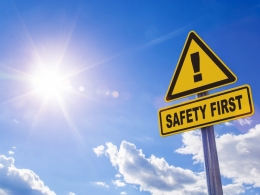
The key message for this week for the 5th annual Farm Safety Week is that farm safety is a lifestyle and not a slogan. Last year 27 people lost their lives in farm accidents in Great Britain, making agriculture one of the most dangerous industries to work in.
Recently we’ve heard news of incidents involving farmers being struck by power lines, getting trapped in a PTO shafts and being run over by tractors. All have come as a shock and have had huge impact on the farming community up and down the country.
Who’s at risk?
Everyone is at risk when working on a farm. Whether you’re male or female, young or old, working with livestock or on an arable farm, everyone is exposed to a certain level of risk.
Who’s responsible?
The simple answer is everyone. As individuals, we’re all responsible for our own health and safety when working with agricultural vehicles. Employers have the additional responsibility of making sure workers are all aware of the risks associated with their roles and with any machinery they might use. Campaigns like Farm Safety Week seek to ensure this is not overlooked, which can be a temptation for a busy farmer running a small business.
It is also why Employer’s Liability insurance is a legal requirement for any business that employs more than one person who is not a close family member.
According to the Health and Safety Executive, in the last ten years almost one person a week has been killed as a direct result of agricultural work. In 2016/17 nine workers were killed as a result of accidents involving farm vehicles. These are both significant statistics which highlight the importance of health and safety at work.
What can you do?
Good weather conditions mean this year’s harvest has started early, and this is the time of year when accidents with farm machinery are most likely to happen. Whether you’re tired or in a rush it only takes a split second for something to go wrong. Reducing the number of accidents on farm should be a priority, so what can you do?
As an employer, ask yourself:
- Do I know what could be a potential risk on my farm?
- Have I carried out a risk assessment? Is the risk assessment up to date and in writing?
- Have I provided the necessary training to my employees and is this evidenced?
- Have all my farm vehicles had regular health checks?
As an employee, ask yourself:
- Have I had the appropriate training to use the agricultural vehicle I’m working on?
- Before I start work have I walked round the vehicle and carried out essential checks on oil, fuel, water levels? Tyre condition? Lights and indicators? Brakes?
- Do I know the safe stop procedure when dismounting a vehicle?
Many accidents involving machinery are caused by moving vehicles, and many of these can be prevented by following the basic Safe Stop procedure. Make sure you know what to do when dismounting a farm vehicle:
- Make sure the handbrake is fully applied.
- Make sure all controls and equipment are left safe.
- Stop the engine and remove the key
Time is precious during harvesting and the temptation not to stop machinery is great. But so is the potential impact of an accident on you, your family and the wider farming community. So if it isn’t already, this week is a good time to think about how farm safety can become a lifestyle and not a slogan for you.
